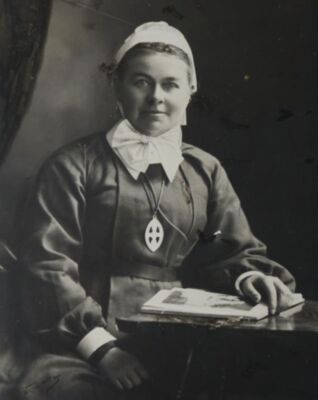Charlotte Shoobridge
Individual, P198
Biography
Charlotte Jean (Jessy) Shoobridge (1848-1925) was the eldest daughter of Ebenezer and Charlotte Shoobridge of Bushy Park in the Derwent Valley. The strongly Christian family took very seriously the keeping and sharing of the faith, with the hop kiln adorned with bible verses and known to this day as the “Text Kiln”. Without a local church in the earlier days, Sunday services were held on the estate, and the girls were expected to go out with their bibles or religious leaflets to visit the womenfolk on the property who were unable to attend the services in the house. As her siblings grew up and left home, she remained on the property with her widowed father. According to her diary, the father re-married twice in old age, the second being a very unwise choice which did not last, and ruined his reputation.
In 1882, Charlotte wrote to St. John's Church, asking if she could come and work in Launceston. Her offer was supported by then rector Canon Richard Nugent Kelly, and warden Ernest Whitfeld. With their encouragement, she was appointed to run the newly established Mission House. Whitfeld told a meeting of the congregation that she would be able assist in “nursing sick women and children, and visiting cases where other women would be afraid to go.”
Much effort was put into converting the former Queen's Head Hotel in Wellington St into a facility that included a reading room, meeting rooms, a chapel and schoolroom. Bedrooms were made available for “those who required sympathetic care and a temporary home.” According to research by Phillip R. Hart in 1963, “Besides evangelistic services, the specific aims of the House were to serve as a refuge for unemployed servant girls, rescue fallen girls and send them to Hope Cottage, and also act as an educational establishment. No distinction was made because of religious views. The work was directed by Tasmania’s only Deaconess, Sister Charlotte Shoobridge, with the help of a nurse. Besides the inevitable Sunday School, there were weekly Mothers’ Meetings combined with a second-hand sale, a girls’ sewing class, which quickly attracted eighty, popular lectures and evening entertainments, a gymnasium and boys’ club, and such practical aids as a Penny Bank and Servants’ Registry.”
In a move that was somewhat controversial among the more “low church” element of the Anglican diocese who were suspicious of anything that looked like nuns and convents, Bishop Montgomery ordained Charlotte Shoobridge as Tasmania's first deaconess in October 1894. She became known to the people of St. John's and Launceston as Sister Charlotte.
By the turn of the 20th century, moves were afoot to build a new Mission House. This was constructed at the same time that St. John's was undergoing the massive building project that resulted in the new dome area, transepts, chancel and sanctuary, but there were numerous generous sponsors.
Sister Charlotte not only served the poor and provided shelter for women in troubled circumstances, but also trained and inspired other women. The most notable of these was Dorothy Genders, The daughter of a wealthy Launceston business family, she felt called to Christian ministry, and served for a period at the Mission House, between 1912 and 1917, under the direction of Deaconess Charlotte Shoobridge. Her biography does not say whether she returned to the Mission House after her studies at Moore College, NSW, and being made a deaconess in 1918, but following her visit to Western Australia in 1928, she was given an appointment to a Perth parish, where she very soon began a work that seems to be very much along the lines of the work of the Mission House in the first three decades of its existence.
There seems to be some confusion about when Charlotte retired. If 1910, as one account suggests, she would not have been a mentor to Dorothy Genders. She retired to southern Tasmania and died in 1925 aged 81.
Source
Mission House article linked below and Masters thesis by Phillip R. Hart, 1963Launceston Sunday Examiner article "Sister Charlotte's special place in church history" - Julian Burgess, 28 April 2024 p.23
Related person
Dorothy Edna Genders (connected with)Online Sources
https://resources.allsaints.network/mission-house/
